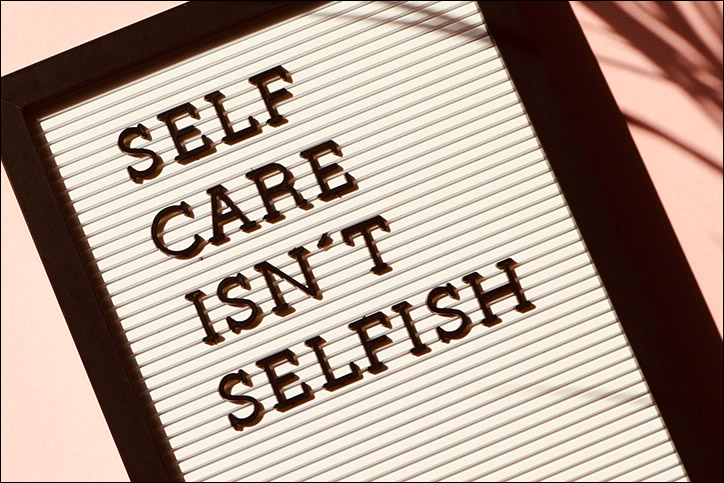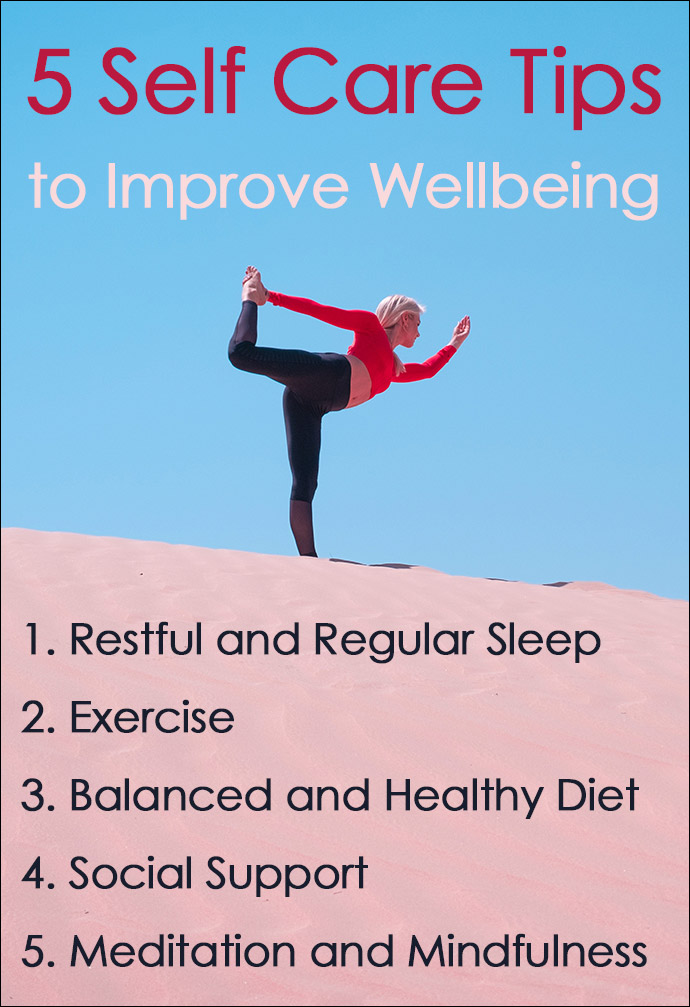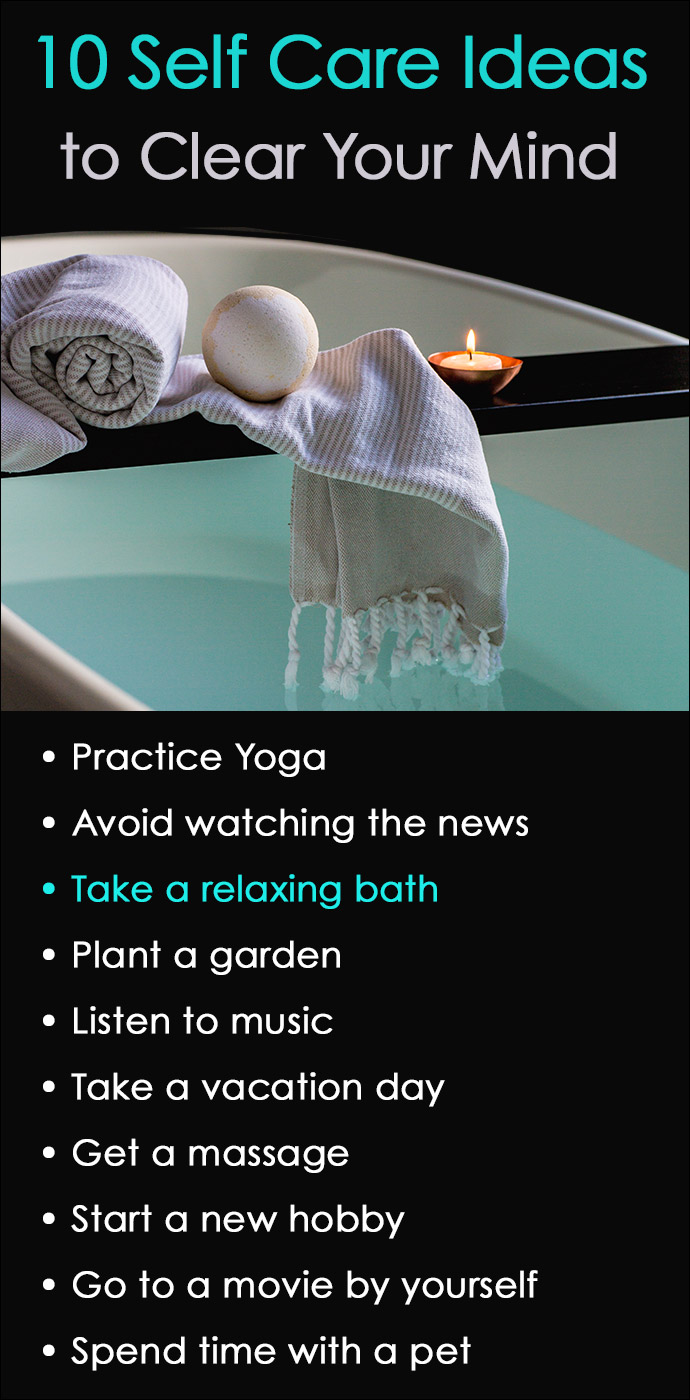Practicing self-care ideas and strategies for better physical and mental health can be started anytime and there are plenty of free ways to do it.
Many people establish a routine at the beginning of a new year in January, while others are reminded about the importance during Self Care Awareness Month in September.
All too often, people make the mistake of thinking self-care is selfish. In fact, it’s quite the opposite. Taking better care of ourselves energizes us, which allows us to be an even greater help to others.
What is Self-Care?
In short, self-care is the practice of developing and maintaining wellbeing for the body and mind, along with our emotional response to life’s inevitable stressors.
Getting enough sleep each night, drinking enough water every day, and taking time to relax are simple ways that help us feel more energized on a physical and emotional level.
Making time to stay healthy in these areas requires a conscious effort, at least in the beginning.
Over time, the best self care ideas and activities can become habits that are prioritized and lead to better overall health and mental wellbeing.
However, this doesn’t mean that life will not have challenging moments. But with a good self-care routine in place, our response to life’s struggles will be more effective, productive, and lasting.
Developing effective tips for self-care activities is easier than many people realize. Perhaps the hardest part of adopting these practices is letting go of the idea that self-care is some sort of extravagance rather than an outright necessity for good health.
3 Types of Self-Care Ideas
On the surface, the thought of self-care ideas may conjure up images of lavish spa days or tropical vacations for many people, although the practice is much more than simply finding ways to relax or unplug.
Some individuals start each morning with a daily affirmation, or spend time journaling in a diary before going to bed at night.
In essence, self-care means taking the time to do things to help you live your best life and prioritizing your personal needs, even if it’s only for a few minutes a day.
Self-Care is a proactive approach to health in three of life’s most important areas.
1. Physical Self-Care Tips
Taking care of our health physically is number one on the list because it affects every area of our lives.
The U.S. Department of Health and Human Services and Office of Disease Prevention and Health Promotion reports that physical health is also connected to mental health.
Not only does poor physical health lead to illness and disease, it can also cause depression, anxiety, and chronic stress that interrupts our personal and professional lives, damages our relationships, and keeps us in a cycle of unhealthiness.
While exercise, diet, and sleep are certainly priorities for good health, physical self-care also includes:
- Seeing a health care provider regularly
- Taking prescribed medications if necessary, especially for older adults
- Managing any risk factors that may lead to poor mental and physical health conditions
2. Mental and Emotional Self-Care
Actively taking care of our mental and emotional health is something many of us never consider. However, it’s important to remember that how we think and view the world, as well as our psychological well-being, is influenced by the things we focus on.
It’s normal to find ourselves in negative patterns of thought, or focusing on, and rehashing recent mistakes and past regrets.
Dwelling on negative thoughts increases stress levels that change the brain chemistry and can cause many types of anxiety disorders.
Learning to forgive ourselves, just as we forgive others and practicing self-love is a key element to mental or emotional self-care.
It’s not always easy, but having compassion for ourselves is vitally important. We are only human after all, and letting go of our mistakes and regrets can help reduce much of the fear and worry we find ourselves living with on a daily basis.
3. Social and Spiritual Self-Care
While this form of self-care can seem somewhat “out there” to some people, social and spiritual self-care doesn’t necessarily have to include religion.
Spiritual wellness examples include activities that we’re passionate about, like feeling connected to nature and having a sense that there is something larger than ourselves.
This kind of self-care also occurs during time spent with friends and family members. Having a close personal connection to others is important for overall mental health.
It can be challenging to make time for others and feed our passions, but even a small amount of time spent in pursuit of social and spiritual self-care practices is incredibly fulfilling.
5 Self Care Ideas to Boost the Way We Feel
At the start of a new year or during Self-Care Awareness Month, take the opportunity to make small changes in your daily life with the goal of practicing better self-care ideas. We don’t have to seek professional help or entirely overhaul our schedules in order to do this.
Simply including some of these easy self-care ideas into our daily regimens can improve our lives:
1. Restful and Regular Sleep
It’s easy to skip out on sleep, but most adults need 6 to 9 hours of healthy, restful sleep a night to help support healthy brain function.
Going to sleep and waking up at the same time every day, even on the weekends, can help establish this routine.
This can be challenging at first. Fortunately, the body will adapt and over time most people will find their mood and energy levels greatly improve after getting a good night’s sleep on a regular basis.
2. Exercise
The mental and physical aspects of exercise in as little as 30 minutes a day works wonders for reducing stress and anxiety, managing weight, and improving sleep and mood. A daily routine of regular exercise is also recommended as a way to reduce many types of depression symptoms.
For some people, this might mean 20 to 30 minutes of walking around the block to move your body. For others, it may include cycling, swimming, hiking, or even playing a sport.
The key is to find an activity that is both enjoyable and gets the body moving. If it becomes a chore or it isn’t enjoyable, most people will stop doing it and lose the health effects and benefits.
Exercising outdoors and spending time in nature can help lift your mood even more due to the healthy effects of sunlight. It is also one of the best ways to release endorphins for dealing with stress.
3. Well-balanced and Healthy Diet
Maintaining a well-balanced and healthy diet rich in fresh fruits, vegetables, and lean proteins goes a long way to helping people get both good sleep and having enough of the right kind of energy to nourish the body for exercise.
A healthy diet can play a major role to boost your mood and mental health because there are fewer spikes in a person’s blood sugar levels.
It may be challenging at first, but avoiding things like alcohol, unhealthy snacks, and processed foods will lead to better overall health and wellness.
4. Social Support
Find ways to engage with family and friends with whom you share a common interest to build a strong social support system.
Staying in touch with people through social media is not enough. Everyone has different social needs, but enjoying face-to-face time with others helps keep us grounded and better connected to ourselves.
Outside of friends and family, volunteering to help others in whatever way possible can be incredibly rewarding and lead to lasting friendships.
5. Meditation and Mindfulness
Practicing meditation and mindfulness is an excellent way to quiet the mind and relieve stress, anxiety and depression.
Mindfulness is the simple practice of being aware of things in the present moment. While on a walk, we should pay attention to how the air on our skin feels, or the way the ground feels beneath our feet.
During a short meditation, staying mindful involves focusing on our breath, the rise and fall of our chest, and just letting thoughts pass through the mind without focusing on them.
According to Mayo Clinic, practicing just 5 to 15 minutes of meditation can reduce stress and is an excellent self-care technique.
10 Self-Care Ideas to Improve Mental Health
There’s no shortage of ways to practice self-care ideas for anxiety or to recharge the mind and relieve stress.
Here are some easy ones that anyone can do.
- Do Yoga
- Avoid watching the news for a week
- Take a relaxing bubble bath
- Plant a garden
- Listen to music
- Take a mental health day from work
- Get a massage
- Learn a new hobby
- Go to a movie by yourself
- Spend time alone at-home with a pet to help boost oxytocin
Most of these can be done alone and don’t require a lot of time.
To be most effective, establish a daily routine and focus all of your attention on these sustainable self-care ideas when doing them. Don’t let your mind wander to other things in your life that may be causing anxiety or stress.






